

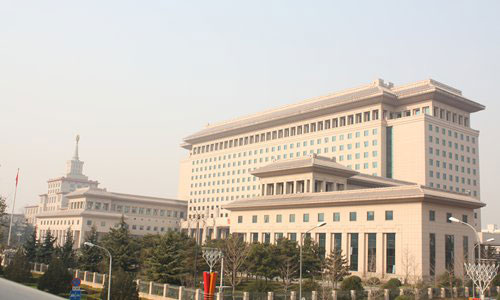
A view of the Bayi Building. [Photo: Global Times]
A demonstration by thousands of veterans at the Beijing headquarters of the PLA last week shocked the public. The demonstrators say it was staged out of mounting anger at local governments which are failing to address their unemployment and pension problems.
Arrive at Tiananmen Square at 5:30 am, watch the national flag raising ceremony, put on military uniforms and start the sit-in. This was the original plan for the thousands of veterans who wanted to protest what they see as insufficient retirement benefits and corruption related to their job allocation, according to insiders close to the demonstration.
This plan was rejected Wang, 56, who served in the army for 22 years before being discharged at the end of 2000 as a colonel, when he was asked for advice. "It is impractical as the security inspectors would spot them when they see so many visitors bringing military uniforms," Wang, a representative of retired soldiers from Weinan, Northwest China's Shaanxi Province, told the Global Times last Thursday, two days after the protest.
Eventually, the location of the protest was shifted to the Bayi Building, the headquarters of the Central Military Commission (CMC) on Chang'an Avenue, six kilometers west of Tiananmen Square.
At dawn on October 11, thousands of people, mostly in their 40s and 50s, started to gather on the sidewalk in front of the Bayi Building. After arriving via the subway, bus or on foot, they changed into their green uniforms and took out flags and banners.
They sang "red" songs and waved banners, some of which read "Devoted to national defense, but where to settle in retirement?" and "No job, no farmland, no social insurance."
A demonstrator who asked to use the pseudonym Li Jun claimed that about 27,000 participants from across the country, including Hebei, Henan, Hunan and Jiangsu provinces, joined the protest.
Song Zhongping, a military commentator and discharged serviceman, said veterans should be respected and well treated.
But he believes that the majority of service people are satisfied with how they are being treated in their retirement.
Now, besides receiving substantial resettlement fees, the country has stepped up efforts to provide service people with technical training to prepare them for civilian work, he noted.
Wang said the veterans did not intend to cause trouble for the government. "There are tensions in the South China Sea and cross-straits relations now. But if the veterans' retirement is not properly treated, how can active servicemen devote themselves and the PLA attract new recruits?" he argued.
Principled demonstration
As ex-PLA soldiers, the veterans said they work to ensure their demonstrations are peaceful.
The demonstrators have rules which say they should not be violent, interrupt transport or disturb residents with noise. When leaving, they voluntarily clear away all their garbage. They also have rules not to confront law enforcement officers or accept interviews with overseas media.
"This is a domestic problem, we don't want to foreign countries to get involved," explained Wang.
The authorities sent buses to the Bayi Building, attempting to evacuate the protesters. But they refused to leave until early morning the next day.
A video sent to the Global Times showed that an official went to meet the Bayi protesters in the evening, saying that the central leadership was aware of the protest and had called up governors from the related provinces to address the issue.
Li said several representatives were selected to talk with the senior officials. At about 6 am on Wednesday, they agreed to leave and were taken to the Jiujingzhuang reception center for petitioners in Fengtai district, where they were sent home.
Li who has already returned to his hometown said that the local government agreed to talk to them and address the problems once they come back. "But no progress was heard so far," he said. "Still we are luckier than some others."
Some demonstrators were detained on their return, and some are still left in Jiujingzhuang as no government officials showed up to fetch them, he said.
The content of the dialogue between the representatives with senior officials is still not known and the demonstrators say they are still waiting for good news.
If no good news is heard, a larger protest will be staged in November, Wang told the Global Times.
Corruption targeted
Demonstrations by veterans have not been rare in China in recent years. In April 2014, hundreds of liangcan veterans - those who served in wars or conflicts after the Korean War (1950-53) or in China's nuclear experiments - gathered outside the office of letters and calls of the CMC and PLA General Political Department in Beijing, demanding better pensions. Nationwide, demonstrations in front of local government buildings have occasionally occurred, often over issues linked to retirement.
The mounting anger mainly comes from the inaction and corruption of local governments, Wang said, "The veterans are furious as a substantial chunk of the funds allocated to them were found going to fake veterans."
Wang, the general consultant of the fraternal association of liangcan, has led several group petitions.
According to him, veterans who are discontented with their pension are mainly from the 830,000 military officers-turned enterprise workers, 43,000 military chiefs demobilized between 1993 and 2001, the 1.76 million liangcan, 2 million veterans with injuries, or disabilities and the relatives of the martyrs.
Li said the protestors on October 11 were mainly veterans who served in the PLA for more than 10 years and were later handed jobs in enterprises that ended up going bankrupt, merging or cutting staff in the 1990s and early 21st century.
The restructuring of China's State-owned enterprises in that period put tens of millions out of work.
According to the central government, local authorities should find jobs for soldiers who serve for more than 10 years. In 2001, the policy was amended to say that soldiers could choose either job allocation or one-off subsidy.
"We are angry as those with connections or who paid bribes to local government officials could always get a better job," Li said, noting that in 2001 he was allocated to a material reserve bureau back his hometown which was restructured into a private company the day he first reported himself at the office. "I have been unemployed ever since. My 13-year service in the army brought me nothing. The government has been ignoring my complaints."
The detention of petitioning veterans has also fueled fury, the demonstrators said.
Qin Shouzhi, a veteran representative from Wuhan, Hubei Province, was detained for seven months by Wuhan police starting in September 2014 after leading several group petitions. Wang said in July 2014, he was detained for a month in Beijing when waiting for a reply to complaints along with 12 other representatives.
Qin Shouzhi, 69, who helped fight the US and its allies during the Vietnam war in the late 1960s, said during the decade-long command of Xu Caihou and Guo Boxiong, the vice chairmen of the CMC who were taken down respectively in 2014 and 2015 for corruption, veterans' complaints were ignored and the climate in the army was bad.
The Ministry of National Defense responded immediately to the protest this time. In a statement sent to the Global Times on Wednesday, the ministry said that the CPC leadership, the State Council and the Central Military Commission care about veterans and pledged to address their problems.
Mixed reactions
However, other reactions toward the demonstration have been mixed. Some say veterans should be treated well as they safeguarded the country.
Some are negative. "Why should the country support retired soldiers for their entire lives. The soldiers are recruited on voluntary basis. It's shameless to request returns," a netizen said.
Qin said veterans like him are not greedy, but are just asking for the benefits the country promised them. He cited the Regulation on Pensions and Preferential Treatments for Servicemen adopted in 2004, which guarantees that pensions for retired soldiers should match the "national economic and social development," and says their quality of life should be no lower than the "local average living standard."
"But many veterans live a desolate life. With few sources of income, they were poorly treated by the local government, their pride about being a veteran is totally gone," Qin told the Global Times. "The central government's policy is there, but local enforcement is poor."
In addition, policies vary in different regions. He cited that in some provinces all liangcan servicemen can get a subsidy of 500 yuan ($74) monthly regardless of where you live, but in some, only those living in impoverished rural areas in poverty can get about 100 yuan.
The cost of pensions and preferential treatment for servicemen is borne by central and local governments The country has announced several increases to the pensions for veterans, but some veterans claim that the rises are not keeping pace with interest.
Qin has been concerned about the veterans seeking better legal benefits since 2011 and has been representing them ever since. In February 2014, Qin and about 1,000 veterans wearing military uniforms staged a demonstration in Beijing. He and four other representatives were met by senior officials.
A senior official from Ministry of Civil Affairs told them they had already proposed an amended draft to the State Council to address soldier's concerns.
"But two years have passed and we've heard no updates," Qin said.
China has carried out several significant cuts to the military since 1985. By 2005, the number of soldiers had been cut to 2.3 million, and had stayed at that number till President Xi Jinping announced in 2015 that the military would cut another 300,000 troops by the end of 2017.
Wang said the remuneration for veterans is much better now. They can not only get subsidies, but are also paid up to 90 percent of the monthly wage they received before being discharged.
"A colonel can now receive a pension of 15,000 yuan a month after being discharged, but my service allowance is just 1,000 yuan," Wang said.
Song said the policies differed in different historical periods, and its not right to compare the policies. "Besides, we shouldn't put the blame squarely on the government for unemployment and poverty. We should also look to our own problems," he said.
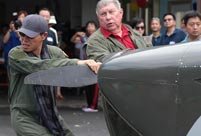 Home-made plane completes test flight in Chicago
Home-made plane completes test flight in Chicago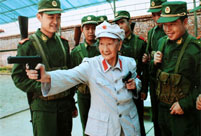 The untold stories of women in the Long March
The untold stories of women in the Long March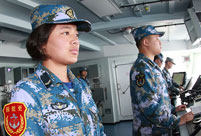 Female soldiers on Frigate Jingzhou
Female soldiers on Frigate Jingzhou Top 10 most beautiful Chinese athletes in Rio
Top 10 most beautiful Chinese athletes in Rio Shenzhen seizes 549 tons of illegally smuggled clothing
Shenzhen seizes 549 tons of illegally smuggled clothing Chinese actor Wang Baoqiang divorces wife, fires manager
Chinese actor Wang Baoqiang divorces wife, fires manager Hangzhou: host city of G20 Summit
Hangzhou: host city of G20 Summit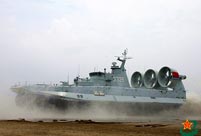 New hovercrafts debut in landing exercise
New hovercrafts debut in landing exercise Woman sets Guinness World Record with 17-month-long pregnancy
Woman sets Guinness World Record with 17-month-long pregnancy Top 10 livable Chinese cities
Top 10 livable Chinese cities Top 20 hottest women in the world in 2014
Top 20 hottest women in the world in 2014 Top 10 hardest languages to learn
Top 10 hardest languages to learn China’s Top 10 Unique Bridges, Highways and Roads
China’s Top 10 Unique Bridges, Highways and Roads Tech tide recedes
Tech tide recedes P2P ‘forbidden zones’ announced
P2P ‘forbidden zones’ announced Clown scare is classic social panic: experts
Clown scare is classic social panic: experts Underground fertility trade booms after relaxation of family planning policy
Underground fertility trade booms after relaxation of family planning policyDay|Week